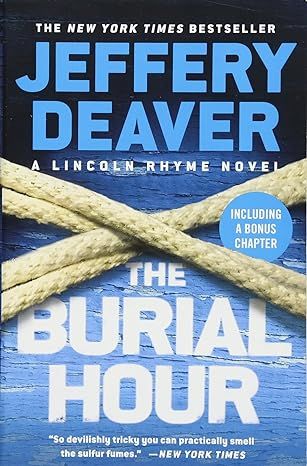The Burial Hour (A Lincoln Rhyme Novel, 14)
4.2
-
12,268 ratings
Forensic detective Lincoln Rhyme is back with his most harrowing case yet in this newest installment of Jeffrey Deaver's New York Times bestselling series.
A businessman snatched from an Upper East Side street in broad daylight. A miniature hangman's noose left at the scene. A nine-year-old girl, the only witness to the crime. With a crime scene this puzzling, forensic expertise of the highest order is absolutely essential. Lincoln Rhyme and Amelia Sachs are called in to investigate.
Soon the case takes a stranger turn: a recording surfaces of the victim being slowly hanged, his desperate gasps the backdrop to an eerie piece of music. The video is marked as the work of The Composer...
Despite their best efforts, the suspect gets away. So when a similar kidnapping occurs on a dusty road outside Naples, Italy, Rhyme and Sachs don't hesitate to rejoin the hunt.
But the search is now a complex case of international cooperation--and not all those involved may be who they seem. Sachs and Rhyme find themselves playing a dangerous game, with lives all across the globe hanging in the balance.
Kindle
$9.99
Available instantly
Audiobook
$0.00
with membership trial
Hardcover
$33.00
Paperback
$13.47
Ships from
Amazon.com
Payment
Secure transaction
ISBN-10
1538745445
ISBN-13
978-1538745441
Print length
512 pages
Language
English
Publisher
Grand Central Publishing
Publication date
January 08, 2018
Dimensions
5.38 x 1.38 x 8 inches
Item weight
14.4 ounces
Product details
ASIN :
B01K3WN6BY
File size :
2774 KB
Text-to-speech :
Enabled
Screen reader :
Supported
Enhanced typesetting :
Enabled
X-Ray :
Enabled
Word wise :
Enabled
Editorial Reviews
"THE BURIAL HOUR keeps readers guessing. Deaver is a master of plot twists, and they are abundant in this story that keeps the reader guessing about who can be trusted and what's behind the motivations of the abductor. Putting Rhyme and Sachs in unknown territory showcases a different side of their characters. Making them jump through hoops to keep international peace gives the story an extra edge."―Marilyn Stasio, Associated Press
"Jeffery Deaver's forte is the diabolical puzzle mystery, and THE BURIAL HOUR is so devilishly tricky you can practically smell the sulfur fumes... In a bold plot twist, Deaver folds Rhyme's inquiries into a broader investigation of a humanitarian challenge shared by the whole world. Takes guts, that does."―Marilyn Stasio, New York Times Book Review
"THE BURIAL HOUR proves once again Jeffery Deaver is a brilliantly intricate novelist. THE BURIAL HOUR is lucky number thirteen in the Lincoln Rhyme/Amelia Sachs series. Taking Rhyme and Sachs out of their New York locale appears to rejuvenate Deaver and his story. Deaver has been writing novels for many years and he has never once disappointed me. Intriguingly detailed."―Jackie K Cooper, Huffington Post
Sample
Chapter 1
Mommy.”
“In a minute.”
They trooped doggedly along the quiet street on the Upper East Side, the sun low this cool autumn morning. Red leaves, yellow leaves spiraled from sparse branches.
Mother and daughter, burdened with the baggage that children now carted to school.
In my day…
Claire was texting furiously. Her housekeeper had—wouldn’t you know it?—gotten sick, no, possibly gotten sick, on the day of the dinner party! The party. And Alan had to work late. Possibly had to work late.
As if I could ever count on him anyway.
Ding.
The response from her friend:
Sorry, Carmellas busy tnight.
Jesus. A tearful emoji accompanied the missive. Why not type the goddamn “o” in “tonight”? Did it save you a precious millisecond? And remember apostrophes?
“But, Mommy…” A nine-year-old’s singsongy tone.
“A minute, Morgynn. You heard me.” Claire’s voice was a benign monotone. Not the least angry, not the least peeved or piqued. Thinking of the weekly sessions: Sitting in the chair, not lying back on the couch—the good doctor didn’t even have a couch in his office—Claire attacked her nemeses, the anger and impatience, and she had studiously worked to avoid snapping or shouting when her daughter was annoying (even when she behaved that way intentionally, which, Claire calculated, was easily one-quarter of the girl’s waking hours).
And I’m doing a damn good job of keeping a lid on it.
Reasonable. Mature. “A minute,” she repeated, sensing the girl was about to speak.
Claire slowed to a stop, flipping through her phone’s address book, lost in the maelstrom of approaching disaster. It was early but the day would vanish fast and the party would be on her like a nearby Uber. Wasn’t there someone, anyone, in the borough of Manhattan who might have decent help she could borrow to wait a party? A party for ten friggin’ people! That was nothing. How hard could it be?
She debated. Her sister?
Nope. She wasn’t invited.
Sally from the club?
Nope. Out of town. And a bitch, to boot.
Morgynn had slowed and Claire was aware of her daughter turning around. Had she dropped something? Apparently so. She ran back to pick it up.
Better not be her phone. She’d already broken one. The screen had cost $187 to fix.
Honestly. Children.
Then Claire was back to scrolling, praying for waitperson salvation. Look at all these names. Need to clean out this damn contact list. Don’t know half these people. Don’t like a good chunk of the rest. Off went another beseeching message.
The child returned to her side and said firmly, “Mommy, look—”
“Ssssh.” Hissing now. But there was nothing wrong with an edge occasionally, of course, she told herself. It was a form of education. Children had to learn. Even the cutest of puppies needed collar-jerk correction from time to time.
Another ding of iPhone.
Another no.
Goddamn it.
Well, what about that woman that Terri from the office had used? Hispanic, or Latino…Latina. Whatever those people called themselves now. The cheerful woman had been the star of Terri’s daughter’s graduation party.
Claire found Terri’s number and dialed a voice call.
“Hello?”
“Terri! It’s Claire. How are you?”
A hesitation then Terri said, “Hi, there. How’re you doing?”
“I’m—”
At which point Morgynn interrupted yet again. “Mommy!”
Snap. Claire spun around and glared down at the petite blonde, hair in braids, wearing a snug pink leather Armani Junior jacket. She raged, “I am on the phone! Are you blind? What have I told you about that? When I’m on the phone? What is so f—” Okay, watch the language, she told herself. Claire offered a labored smile. “What’s so…important, dear?”
“I’m trying to tell you. This man back there?” The girl nodded up the street. “He came up to another man and hit him or something and pushed him in the trunk.”
“What?”
Morgynn tossed a braid, which ended in a tiny bunny clip, off her shoulder. “He left this on the ground and then drove away.” She held up a cord or thin rope. What was it?
Claire gasped. In her daughter’s petite hand was a miniature hangman’s noose.
Morgynn replied, “That’s what’s so—” She paused and her tiny lips curled into a smile of their own. “Important.”
Chapter 2
Greenland.”
Lincoln Rhyme was staring out the parlor window of his Central Park West town house. Two objects were in his immediate field of vision: a complicated Hewlett-Packard gas chromatograph and, outside the large nineteenth-century window, a peregrine falcon. The predatory birds were not uncommon in the city, where prey was plentiful. It was rare, however, for them to nest so low. Rhyme, as unsentimental as any scientist could be—especially the criminal forensic scientist that he was—nonetheless took a curious comfort in the creatures’ presence. Over the years, he’d shared his abode with a number of generations of peregrines. Mom was here at the moment, a glorious thing, sumptuously feathered in brown and gray, with beak and claws that glistened like gunmetal.
A man’s calm, humorous voice filled the silence. “No. You and Amelia cannot go to Greenland.”
“Why not?” Rhyme asked Thom Reston, an edge to his tone. The slim but sturdy man had been his caregiver for about as long as the line of falcons had resided outside the old structure. A quadriplegic, Rhyme was largely paralyzed south of his shoulders, and Thom was his arms and legs and considerably more. He had been fired as often as he’d quit but here he was and, both knew in their hearts, here he would remain.
“Because you need to go someplace romantic. Florida, California.”
“Cliché, cliché, cliché. Might as well go to Niagara Falls.” Rhyme scowled.
“What’s wrong with that?”
“I’m not even responding.”
“What does Amelia say?”
“She left it up to me. Which was irritating. Doesn’t she know I have better things to think about?”
“You mentioned the Bahamas recently. You wanted to go back, you said.”
“That was true at the time. It’s not true any longer. Can’t one change one’s mind? Hardly a crime.”
“What’s the real reason for Greenland?”
Rhyme’s face—with its prominent nose and eyes like pistol muzzles—was predatory in its own right, much like the bird’s. “What do you mean by that?”
“Could it be that there’s a practical reason you want to go to Greenland, a professional reason? A useful reason?”
Rhyme glanced at the single-malt scotch bottle sitting just out of reach. He was largely paralyzed, yes. But surgery and daily exercise had returned to him some ability to move his right arm and hand. Fate had helped too. The beam that had tumbled upon his neck from a crime scene many years ago and severed and crushed many nerves had left a few outlying strands intact, if injured and confused. He could grasp objects—like single-malt scotch bottles, to pick a random example—but he could not rise from his complex wheelchair to fetch them if Thom, playing nursemaid, kept them out of goddamn reach.
“Not cocktail hour yet,” the aide announced, noting the arc of his boss’s vision. “So, Greenland? ’Fess up.”
“It’s underrated. Named ‘Greenland’ while much of it’s barren. Not the least verdant. Compare Iceland. Quite green. I like the irony.”
“You’re not answering.”
Rhyme sighed. He disliked being transparent and hugely disliked being caught being transparent. He would appeal to truth. “It seems that the Rigspolitiet, the Danish police, have been doing rather important research into a new system of horticultural spectrographic analysis in Greenland. A lab in Nuuk. That’s the capital, by the way. You can situate a sample in a much narrower geographic area than with standard systems.” Rhyme’s brows rose involuntarily. “Nearly the cellular level. Imagine! We think all plants are the same—”
“Not a sin of mine.”
Rhyme groused, “You know what I mean. This new technique can narrow down a target area to three meters!” He repeated, “Imagine.”
“I’m trying to. Greenland—no. And has Amelia actually deferred to you?”
“She will. When I tell her about the spectrograph.”
“How about England? She’d love that. Is that show on still, the one she likes? Top Gear? I think the original is off the air but I heard there’s a new version. She’d be great on it. They let people go out on the racetrack. She’s always talking about driving a hundred and eighty miles an hour on the wrong side of the road.”
“England?” Rhyme mocked. “You’ve just lost your argument. Greenland and England offer the same degree of romance.”
“You’ll find some disagreement there.”
“Not from the Greenlanders.”
Lincoln Rhyme did not travel much. The practical consequences of his disability added a layer of complication to journeys but physically, his doctors reported, there was no reason not to hit the road. His lungs were fine—he’d weaned himself off a ventilator years ago, the chest scar present but not prominent—and as long as such matters as the piss ’n’ shit details—his words—and low-chafing clothing were attended to, there was little chance of being afflicted by the quad’s bane: autonomic dysreflexia. A good portion of the world was disabled-accessible now—with most enterprises, from restaurants to bars to museums, offering ramps and special restrooms. (Rhyme and Sachs had shared a smile when Thom pointed out an article in the paper about a school that had recently installed a disabled ramp and bathroom; the place taught only one thing: tap dancing.)
No, much of Rhyme’s reluctance to travel and his reclusiveness were simply because he was, well, a recluse. By nature. Working in his laboratory—the parlor here, filled with equipment—and teaching and writing for scientific journals appealed to him far more than tired sights polished for tourists.
But, given what was on his and Sachs’s agenda in the next few weeks, a trip outside Manhattan was necessary; even he admitted that one could not honeymoon in one’s own hometown.
Plans for trips to labs specializing in horticultural spectrometry, or locales of wooing romance, were, though, put on hold for the moment; the door buzzer sounded. Rhyme glanced at the security video and thought: Well.
Thom rose and returned a moment later with a middle-aged man in a camel-tan suit, which he might have slept in, though he probably hadn’t. He moved slowly but with little hesitation, and Rhyme thought that pretty soon he’d be able to discard the cane, which was, however, a pretty nifty accessory. Black with a silver head in the shape of an eagle.
The man looked around the lab. “Quiet.”
“Is. A few small private jobs recently. Nothing fun. Nothing exciting. Nothing since the Steel Kiss killer.” A recent perpetrator had taken to sabotaging household items and public conveyances—with tragic and occasionally gruesome results.
NYPD detective Lon Sellitto, in the Major Cases Division, had been Rhyme’s partner—before Rhyme had moved up to captain and taken over the Crime Scene Unit. Nowadays Sellitto would occasionally hire Rhyme to consult on cases in which special forensic expertise was needed.
“What’re you looking at? Tan is all I had.” Sellitto waved toward his suit.
“Daydreaming,” Rhyme said. “I wasn’t looking at anything.”
Not true, but he hadn’t been regarding either the curious color of or the savage wrinkles in the suit. He was noting, with satisfaction, that Sellitto was recovering well following the attack on him by poison, which had caused major nerve and muscle damage—hence, the cane. While the detective was always fighting his weight, Rhyme thought he looked better on the portly side, like now. The sight of a gaunt, gray Lon Sellitto had been alarming.
“Where’s Amelia?” Sellitto asked.
“In court. Testifying in the Gordon case. On the calendar first thing. Should be over with soon. Then she was going shopping. For our trip.”
“Buying herself a trousseau? What is that anyway?”
Rhyme had no idea. “Something about weddings, clothing. I don’t know. But she’s got a dress already. Something frilly. Blue. Or maybe pink. Today she’s shopping for me. What’s so goddamn funny, Lon?”
“Picturing you in a tuxedo.”
“Just sweats and a shirt. Maybe a tie. I don’t know.”
“Tie? And you didn’t complain?”
True, Rhyme had little patience for what he considered affectation. But this occasion was different. For all her edge and edginess and her need of speed and blunt firearms, her passion for tactical solutions, Sachs had a splinter of teen girl within her and she was enjoying the game of wedding planning. This included shopping for a whatever-the-hell-it-was trousseau and a romantic honeymoon, and if that pleased her, by God, Rhyme was more than happy to accommodate.
Though he really hoped he could convince her about Greenland.
“Well, tell her to shop later. I need her to run a scene. We’ve got a situation.”
A ping resounded within Rhyme the way a submarine’s sonar detects something unexpected off the port bow.
He texted Sachs and received no response. “Maybe on the stand, testifying. Tell me more.”
Thom appeared in the doorway—Rhyme hadn’t realized he’d left. The aide said, “Lon, coffee? Cookies? I’ve been baking. I’ve got a couple of different kinds. One is—”
“Yes, yes, yes.” It was Rhyme answering. “Bring him something. Make a decision yourself. I want to hear his story.”
Situation…
“Proceed,” he told Sellitto.
“Anything chocolate,” Sellitto called to Thom’s back.
“Easily arranged.”
“Kidnapping, Linc. Upper East Side. Apparently one adult male snatched another.”
“Apparently? What requires interpretation?”
“The only wit was nine years old.”
“Ah.”
“Perp grabs vic, tosses him into a car trunk. Takes off.”
“The girl is sure about this? Not a figment of her overactive little imagination, stoked by watching too much television, ruining her thumbs on video games, reading too many Hello Pony stories?”
“Hello Kitty. Ponies are a different book.”
“Did Mommy or Daddy confirm?”
“Morgynn, the girl, was the only one who saw. But I think it’s legit. She found a calling card he’d left behind.” Sellitto held up his phone and displayed a photo.
At first Rhyme couldn’t make out the image. It was a picture of a dark shape, thin, lying on a sidewalk.
“It’s a—”
Rhyme interrupted. “Noose.”
“Yep.”
“Made out of?”
“Not sure. Girl said he set it on the spot where he got the vic. She picked it up but the responding set it back in the same place he’d left it, more or less.”
“Great. I’ve never worked a scene contaminated by a nine-year-old.”
“Relax, Linc. All she did was pick it up. And the responding wore gloves. Scene’s secure, waiting for somebody to run it. Somebody, as in Amelia.”
The noose was made out of dark material, which was stiff, since segments were not flush with the pavement, as would be the case with more limp fibers. From the size of the poured-concrete sidewalk panel, the noose was about twelve to fourteen inches long in total, the neck hoop about a third of that.
“The wit’s still on scene. With Mommy. Who isn’t very happy.”
Neither was Rhyme. All they had to go on was a nine-year-old schoolgirl with the observational skills and perception of a…well, nine-year-old schoolgirl.
“The vic? Rich, politically active, connected with OC, record?”
Sellitto said, “No ID yet. Nobody reported missing. A few minutes after the snatch somebody saw a phone fly outta a car—dark sedan, nothing more. Third Avenue. Dellray’s boys’re running it. We find out who, we find out why. Business deal gone bad, vic has information somebody wants, or the old standby. For-profit ransom.”
“Or it’s a psycho. There was the noose, after all.”
“Yeah,” Sellitto said, “and the vic just happened to be WTWP.”
“What?”
“Wrong time, wrong place.”
Rhyme scowled once more. “Lon?”
“It’s going around the department.”
“Flu viruses—not viri, by the way—go around the department. Idiotic expressions do not. Or should not, at least.”
Sellitto used the cane to rise to his feet and aimed his bulky form toward the tray of cookies that Thom was setting down, like a Realtor seducing prospective buyers at a condominium open house. The detective ate one, then two, then another, nodded approval. He poured himself a cup of coffee from a silver pitcher and spilled in artificial sweetener, his concession to the battle against calories being to sacrifice refined sugar for pastry.
“Good,” he announced through a mouthful of cookie. “You want one? Some coffee?”
The criminalist’s eyes swiveled instinctively toward the Glenmorangie, sitting golden and alluring on the high shelf.
But Lincoln Rhyme decided: No. He wanted his faculties about him. He had a feeling that the girl’s observations were all too accurate, that the kidnapping had occurred just as she had described it and that the macabre calling card was a taunting message of a death soon to be.
And perhaps more after that.
He texted Amelia Sachs once again.
Read more
About the authors
Jeffery Deaver
Jeffery Deaver is an international number-one bestselling author. His novels have appeared on bestseller lists around the world. His books are sold in 150 countries and translated into over twenty-five languages. He has served two terms as president of Mystery Writers of America, and was recently named a Grand Master of MWA, whose ranks include Agatha Christie, Ellery Queen, Mary Higgins Clark and Walter Mosely.
The author of over forty novels, three collections of short stories and a nonfiction law book, and a lyricist of a country-western album, he’s received or been shortlisted for dozens of awards. His "The Bodies Left Behind" was named Novel of the Year by the International Thriller Writers association, and his Lincoln Rhyme thriller "The Broken Window" and a stand-alone, "Edge," were also nominated for that prize. "The Garden of Beasts" won the Steel Dagger from the Crime Writers Association in England. He’s also been nominated for eight Edgar Awards by the MWA.
Deaver has been honored with the Lifetime Achievement Award by the Bouchercon World Mystery Convention, the Strand Magazine’s Lifetime Achievement Award and the Raymond Chandler Lifetime Achievement Award in Italy.
His book "A Maiden’s Grave" was made into an HBO movie starring James Garner and Marlee Matlin, and his novel "The Bone Collector" was a feature release from Universal Pictures, starring Denzel Washington and Angelina Jolie. Lifetime aired an adaptation of his "The Devil’s Teardrop." NBC television recently aired the nine-episode prime-time series, "Lincoln Rhyme: Hunt for the Bone Collector."
You can find out more about Jeffery on his website www.jefferydeaver.com, Facebook page facebook.com/JefferyDeaver, and follow him on Twitter @JefferyDeaver.
Read more
Reviews
Customer reviews
4.2 out of 5
12,268 global ratings
C Wm (Andy) Anderson
5
"The Burial Hour;" Suspense, Intrigue, with Twists Aplenty - Not Your Typical Plot-Driven Crime Fiction Novel
Reviewed in the United States on April 12, 2017
Verified Purchase
*** LANGUAGE *** Written in Adult English, with just a smattering of f-bombs, this is the sort of Crime Fiction that, these days, would probably feel artificial if it didn’t include such profanities. This is all the more true, I believe, because some of our characters are of what some might refer to as high-brow stock. What I mean is, cultured. I always feel uncomfortable trying to fit in with people of this background – what were referred to as gentlemen in the Navy. [Please excuse my sense of humor if it annoys you.]
Quick Overview
This is another installment of a series of books begun in 1997. For fans of the series, I’m confident they will not be reading this review, so I’m going to write it more for those not familiar with the characters starring in The Burial Hour.
We learn quite a bit, in just a few lines in the opening chapter, about Lincoln Rhyme. His admiration of a local peregrine falcon, and the fact that he is a bit more cultured that most detectives we see portrayed in film is shown to us immediately. He is cultured and, as an example of how he thinks differently that most men, he’s planning on a romantic getaway to Greenland, instead of Niagara Falls. [New writers could gain immensely by studying this opening chapter on how to show, not tell, their readers a tale].
Mind you, Rhyme is a quadriplegic, having suffered a terrible injury at a crime scene years previously, and is a dedicated forensic scientist, so he may have more than one reason for skipping a visit to the more usual destinations frequented by honeymooners.
Without revealing too much, I hasten to inform you not to feel sorry for his bride-to-be, for she also is not too typical. Simply put, despite this being the 13th book, it is written as a stand-alone for those new Lincoln Rhyme fans-to-be.
This is Crime Fiction that keeps one guessing and that is a far faster read than the 752 pages it fills.
I’ve excerpted a small piece from Chapter 8 that gives a good feel for Lincoln and his wry humor that sounded like some of my retorts when watching television and somebody feels obligated to ensure they have the correct understanding.
Q - Target Audience/Genre and is it marketed as Nonfiction or Fiction: A – Crime Fiction, International intrigue.
Q - How was this book obtained? A – Bought on Amazon.
Q – If this is a recurring character or a series, does it have a cliffhanger ending? A – No cliffhanger ending.
To give a feel for the editing, and the style and flow of this work, I am posting a brief excerpt below.
Excerpt
He scanned the chart. “Those scraps of paper you found? The photo paper?
“Right.”
“Play jigsaw puzzle with them. See how they fit together.”
After pulling on gloves she opened the plastic evidence envelope and arranged the slips. “They make a frame, see? Something was cut out of the middle. A perfect square.”
Rhyme then consulted his computer. He asked, “One that measures fifty-one centimeters by fifty-one, by any chance?”
Sachs applied a ruler. She laughed. “Exactly.”
Sellitto grunted, “How the hell’d you know that, Linc?”
“G—d--n it.” He nodded at the burned triangle of paper, containing the mysterious code.
CASH T EXCHA CONVER TRANSAC
More typing. Rhyme reviewed the screen and said, “Try this: ‘Cash Tendered. Exchange Rate. Converted Amount. Transaction Amount.’” He nodded at the screen. “I found a receipt from a currency exchange. That’s what it is. And the square cut out of the glossy paper. It’s the size—”
Sellitto filled in, “A passport photo. Oh, hell.”
“Exactly,” Rhyme said, exhaling slowly. “Call Washington.”
“DC?” Cooper asked.
“Of course DC. I hardly want a cup of Starbucks or a Microsoft Windows upgrade, now, do I? Tell the State Department to alert the embassies that the Composer’s headed out of the country. Dellray too. Get him on the wire to the FBI offices abroad.” Another scowl. “Don’t know what good it’ll do. No solid description or other info to give Passport Control.” He shook his head in dismay. “And if he’s as smart as he seems to be, he’s not wasting any time. He’s probably halfway to London or Rio by now.”
Deaver, Jeffery. The Burial Hour (A Lincoln Rhyme Novel) (Kindle Locations 635-651). Grand Central Publishing. Kindle Edition.
Bottom Line:
I enjoyed this story enough to put the Audible version in my Audible wish list so I can listen to it in the future. I wish, though, that the publisher had considered a steep discounted Whispersync Audio version for those of us who buy print and audio.
Five stars out of five.
Comments regarding your opinion of this book or of my review, whether favorable or unfavorable, are always welcome. If you buy the book based on my review and become disappointed, especially, I do want to know that and I want to understand how I can improve as a book reviewer. Just please be polite.
Thank you.
Read more
24 people found this helpful
Eugene Mariani
5
Rhyme Time
Reviewed in the United States on June 20, 2017
Verified Purchase
Once again, Jeffery Deaver has concocted a thrilling tale of intrigue and mystery. It begins when a traveling business man is snatched from an Upper East Side street in broad daylight. The only witness is a little girl whom no one seems to believe at first. But the perp leaves a clue – a miniature hangman’s noose made of catgut. Such a puzzling crime scene screams for the expertise of the world famous Lincoln Rhyme and his beautiful assistant Amelia Sachs to investigate. The perpetrator eludes them and escapes to parts unknown.
The investigation soon takes on an international flavor when a similar crime is committed across the ocean in a small town outside Naples, Italy. As with the crime in America, the perpetrator leaves clues that indicate an obsession with music and death. He records the victim’s breaths as marking time beats in an otherworldly recording of some classical tune.
The search for the killer then takes on a more complex aspect as the investigation of clues begins to show a pattern of a more complex plot. Rhyme and Sachs soon find themselves in the middle of a very dangerous game involving shadowy figures from across the globe. The reader knows that all is not as appearances seem. The final denouement is one not to be missed. As a bonus, the lives of Lincoln and Amelia are brought to another level of development. This reader cannot wait for the next Lincoln Rhyme thriller!
Read more
2 people found this helpful
M & J Gorman
5
Great overseas plot,
Reviewed in the United States on July 25, 2023
Verified Purchase
Deaver moves the crime fighting duo to Italy to catch a sinister kidnapper as he terrorizes illegal immigrants attempting a new start in Italy. This novel is fast-paced and keeps the reader guessing throughout the story. A real keeper.
Andrea F Day
5
As always, Lincoln and Sachs saved the day.
Reviewed in the United States on July 20, 2023
Verified Purchase
Their stories are always interesting and informative, and keep you guessing til the end. The rich descriptions of the scenery and culture of Italy were informative and enjoyable. If you're a crime/mystery buff, read Deaver!!
Steven Meisel
4
Same formula; unique additions
Reviewed in the United States on August 2, 2017
Verified Purchase
The Burial Hour is the umpteenth entry in the Lincoln Rhyme series. In each of these books, Deaver keeps to a standard formula and writing style: complex (and often absurd) chemical forensic analysis, a weirder than can be believed villain, danger for one or more of the protagonists, fast pace chapters, and unique twists to keep it interesting.
One would think that after so many entries, the series would grow tired and dull. In fact, some of the recent entries have been borderline. But Deaver adds life to the series in the Burial Hour. Moving from New York City to Naples, Italy provides a refreshing setting and ambiance. I even learned a few factoids of the area. New partners with the Italian police, although somewhat cartoonish and stereotypical, provides for unique dialog and interaction. And Deaver goes out of his way with the number and creativity of the plot line, twists, and turns. At least for one book, Deaver "saves" this series.
Never to be confused wi fine literature, the Burning Hour is nevertheless an extremely engrossing and engaging police procedural.
Read more
4 people found this helpful
Top Jeffery Deaver titles
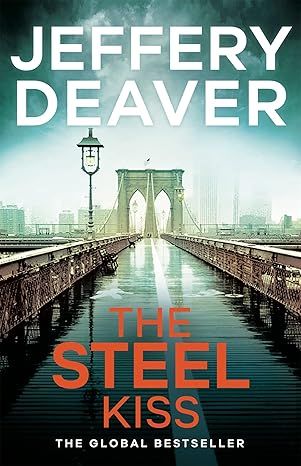
The Steel Kiss: Lincoln Rhyme Book 12 (Lincoln Rhyme Thrillers)
4.3
-
15,078
$2.55
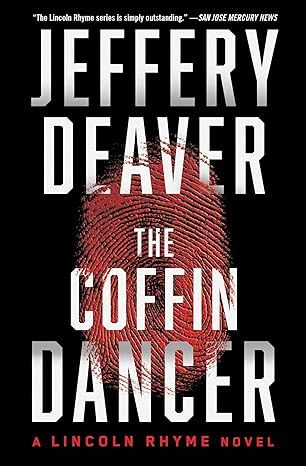
The Coffin Dancer: A Novel (2) (Lincoln Rhyme Novel)
4.5
-
5,617
$1.31
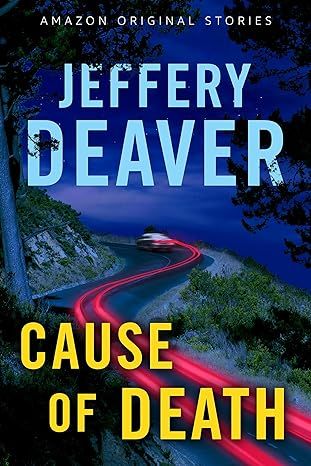
Cause of Death
4.2
-
5,166
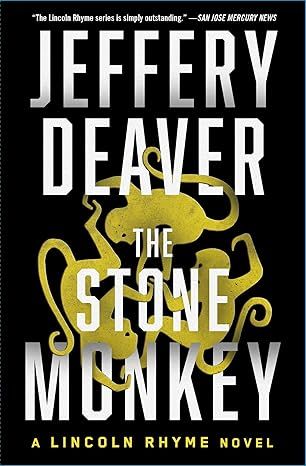
The Stone Monkey: A Lincoln Rhyme Novel (4)
4.5
-
4,802
$1.24
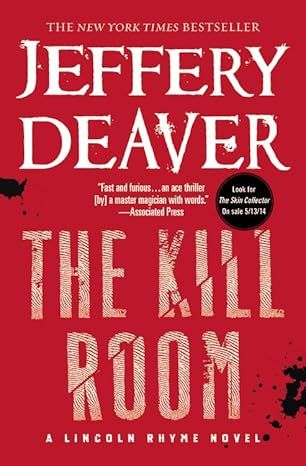
The Kill Room (Lincoln Rhyme)
4.3
-
6,193
$5.29
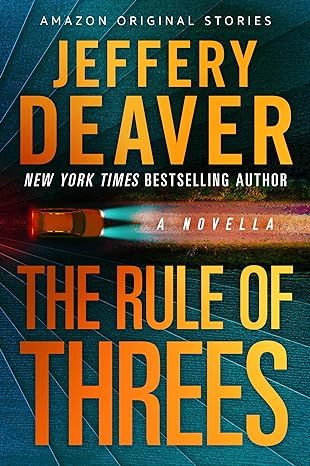
The Rule of Threes: A Novella
4
-
10,459
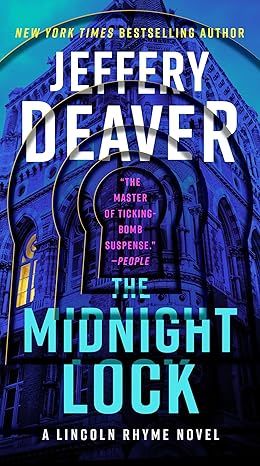
The Midnight Lock (Lincoln Rhyme Novel)
4.5
-
10,344
$2.05
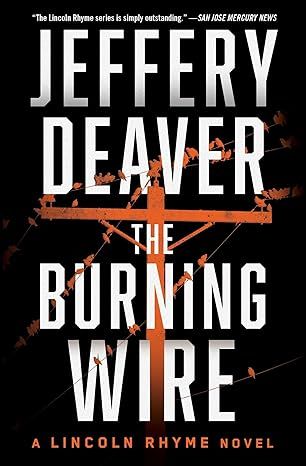
The Burning Wire (9) (Lincoln Rhyme Novel)
4.4
-
5,500
$3.99
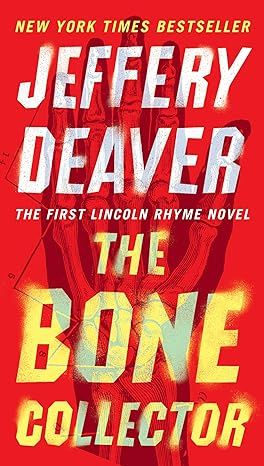
The Bone Collector (Lincoln Rhyme Novel)
4.5
-
7,183
$7.99

The Pain Hunter (The Broken Doll Book 1)
4.2
-
5,263
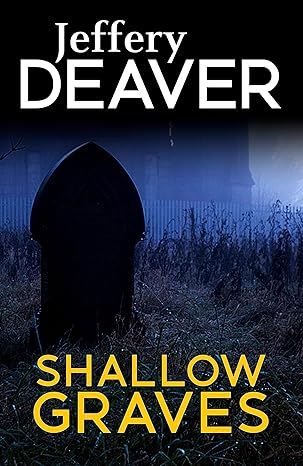
Shallow Graves
4
-
1,304
$3.82
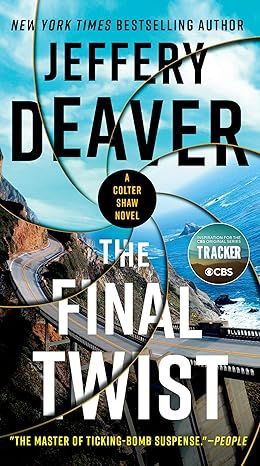
The Final Twist (A Colter Shaw Novel)
4.5
-
8,168
$1.97
Best Sellers

The Tuscan Child
4.2
-
100,022
$8.39

The Thursday Murder Club: A Novel (A Thursday Murder Club Mystery)
4.3
-
155,575
$6.33

Sapiens: A Brief History of Humankind
4.6
-
140,302
$13.49

The Butterfly Garden (The Collector, 1)
4.3
-
88,556
$9.59

Things We Hide from the Light (Knockemout Series, 2)
4.4
-
94,890
$11.66

The Last Thing He Told Me: A Novel
4.3
-
154,085
$2.99

The Perfect Marriage: A Completely Gripping Psychological Suspense
4.3
-
143,196
$9.47

The Coworker
4.1
-
80,003
$13.48

First Lie Wins: A Novel (Random House Large Print)
4.3
-
54,062
$14.99

Mile High (Windy City Series Book 1)
4.4
-
59,745
$16.19

Layla
4.2
-
107,613
$8.99

The Locked Door
4.4
-
94,673
$8.53
